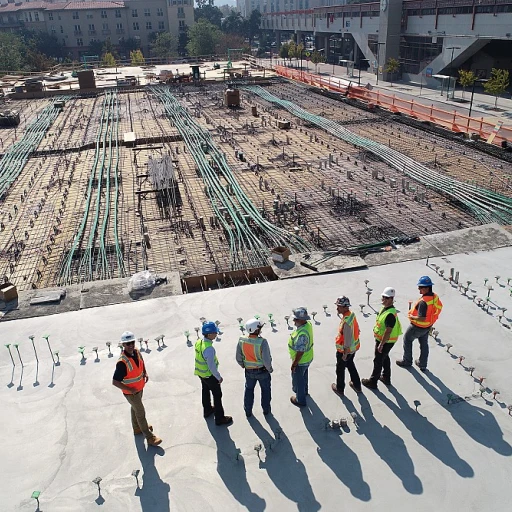
Understanding the Role and Responsibilities
Clarifying Position Expectations
When gearing up for an internal interview within your company, understanding the role and responsibilities is crucial. Start off by asking questions that offer a clear picture of what the hiring manager expects from the position. These questions not only help you determine if you're a fit for the current job but also provide insights into how the role aligns with your career aspirations. Consider these aspects:- Daily Responsibilities: What will a typical day look like? How does this position contribute to the team or company?
- Team Dynamics: Inquire about the team members you’ll be working with. Understanding your potential coworkers will give you a sense of the company culture and whether the internal hiring process values collaboration.
- Current Challenges: Identify the current challenges the team faces. This can offer a glimpse into problem-solving abilities required and the level of expertise expected.
Evaluating Technical Skills and Expertise
Assessing Technical Proficiency
When evaluating technical skills and expertise during an internal interview, it's crucial to tailor your questions to the specific demands of the role. This ensures that the internal candidate is not only familiar with the current job but also equipped to handle the challenges of the new position. Here are some strategies to consider:
- Role-Specific Questions: Focus on the technical requirements of the job. Ask questions that delve into the candidate's experience with the technologies and tools they will use. For example, "Can you share an example of a project where you utilized [specific technology]?" This helps gauge their practical experience.
- Problem-Solving Scenarios: Present hypothetical scenarios that the candidate might face in the new role. This not only tests their technical skills but also their ability to think critically and solve problems effectively. Consider asking, "How would you approach a situation where [specific challenge]?"
- Team Collaboration: Since internal mobility often involves working closely with current team members, it's important to understand how the candidate collaborates on technical tasks. Questions like "How do you ensure effective communication with your team during a project?" can provide insights into their teamwork abilities.
- Continuous Learning: In the fast-paced tech industry, staying updated with the latest advancements is key. Ask about their commitment to learning and adapting to new technologies. For instance, "What steps do you take to keep your technical skills current?"
These questions will help hiring managers determine if the internal candidate possesses the necessary technical skills for the role. Additionally, understanding their approach to problem-solving and collaboration can offer a comprehensive view of their potential fit within the team.
For more insights on choosing the right hiring approach, consider reading about direct hire and recruiter options for tech talent.
Assessing Problem-Solving Abilities
Evaluating Problem-Solving Abilities in Internal Interviews
When an internal candidate steps into a job interview for a new position within the same company, it is imperative to gauge their problem-solving capabilities. This critical skill not only ensures they can fulfill the requirements of the current role but also determines their ability to adapt to changes and overcome challenges within the team's dynamics. Conducting an interview process that includes questions focused on problem-solving allows hiring managers to get a glimpse of how candidates handle real-world scenarios. Here are a few considerations and questions hiring managers can use:- Describe a situation in your current role where you faced a major obstacle. How did you approach the problem, and what was the outcome?
- How do you prioritize tasks when you are faced with multiple tight deadlines? Can you share an example of when this happened?
- Discuss a time when you needed to make a decision quickly without having all the necessary information. How did you handle it, and what did you learn?
Cultural Fit and Team Dynamics
Evaluating Fit with Company Culture and Dynamics
Understanding your company culture is essential when assessing candidates for internal mobility. During the internal interview, consider how the individual aligns with the current role and company's mission. Ask questions that gauge their adaptability and compatibility with the team environment. For instance, "How do you make decisions when faced with competing priorities within a team?" or "Describe a time when you had to build rapport with a team member who had a different working style." These questions help determine if the candidate will seamlessly integrate into the team dynamics. Also, observe how well the candidate collaborates with their current team members, as this can provide insights into their potential in a new position. Understanding how they communicate, manage conflict, and contribute to collective goals is invaluable. For example, "Can you share an example of a successful project you led with your team and what made it successful?" Internal candidates often know the internal processes and culture, making them viable long-term assets. A hiring manager must evaluate both the soft skills and the candidate's potential to grow within the company. Internal hiring is unique, as assessing cultural fit and team dynamics goes hand-in-hand with evaluating technical skills and problem-solving abilities, which adds a layer of nuance to the interview process. When conducted effectively, these assessment strategies will help you place the right candidate in the right internal position, fostering growth and success for both the individual and your company.Career Development and Growth Potential
Exploring Long-Term Aspirations and Opportunities
The interview process for an internal tech position isn't just about assessing the current skills and competencies of a candidate. It's also crucial to gain insight into their long-term career aspirations. This understanding can help ensure alignment with the company's vision and growth opportunities. For internal candidates, asking questions about their career development plans is vital. These questions will help the hiring manager better determine if the candidate's aspirations match the potential career paths available within the company.- How do you envision your career developing in this role?
- This question seeks to understand if the candidate has a clear vision for their future and how they plan to leverage their current role as a stepping stone.
- What steps have you taken in your current role to prepare for new challenges?
- By asking this, you can gauge their proactive nature and readiness for future responsibilities.
- Can you share an example of a career challenge you overcame, and what was the impact?
- This question unravels the candidate's ability to reflect on past experiences and how they intend to apply lessons learned to their future endeavors.













